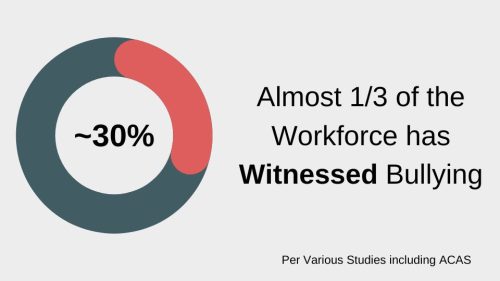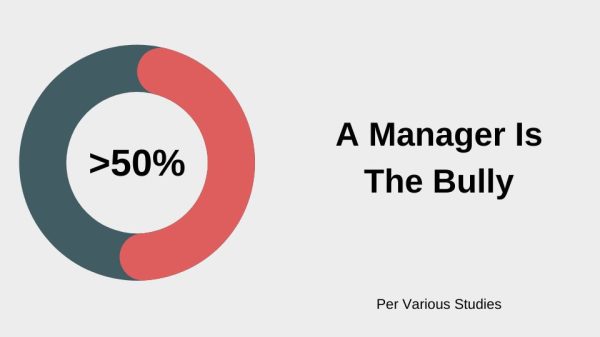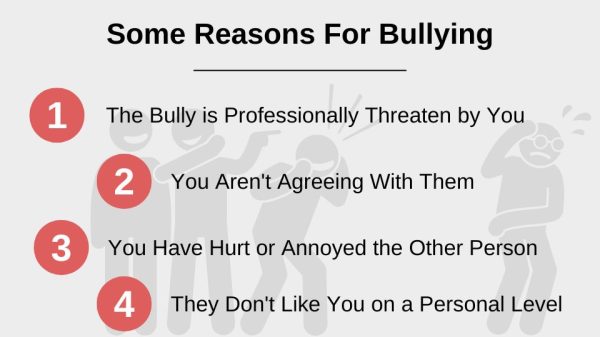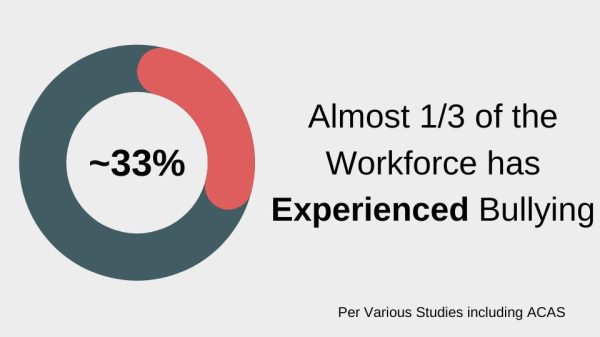5 Reasons Leaders Should Care About Bullying & 7 Ways to Stop Bullying

Leaders should care about bullying on their teams and within their companies. If leaders and managers turn a blind eye or don’t actively look for bullying within their company and take effective action when the find it, bullying will be portrayed acceptable within the company and spread.
Bullying and harassment at work is still a significant issue, including 1 in ten reporting cyber bullying.
The data shows that more than half of bullying within the workplace is undertaken by managers. Leaders should care about bullying by their own managers even more than bullying by staff members, because managers have more influence and impact a greater number of staff members.
In section 5, I suggest 7 ways to prevent bullying and limit the impact of bullying when it does happen. Leaders and managers through their behaviours, actions, and decisions set the expectations and behaviours of the company. What reputation do you want to cultivate with your team?
5 reasons leaders should care about bullying
- Bullying kills trust
- Bullying damages team performance
- Reputation matters in talent attraction
- A legal risk that impacts everyone
- Preventing bullying costs a fraction of the cost of bullying in the workplace

Watch on YouTube
Listen on Podcast
A key reason why managers should care about bullying is bullying kills trust
Bullying rarely happens without team members noticing. Chances are when the manager finds out about bullying within the team or being suffered by a team member, the rest of the team already know about it.
At this point trust is maintained if the manager takes sensible action immediately or seriously damaged if nothing is visually done.
If the manager doesn’t show they care, or if they think it is the employee’s problem, the rest of the team members will be thinking “what happens when its my turn”. Suddenly those calls from recruiters offering them jobs become more appealing. Motivation drops. Respect for the manager drops. Output drops. This can easily happen across all team members and suddenly there is a real performance problem in the team.
Without trust, I don’t believe you have a team, just a collection of individuals. A team outperforms groups of individuals day in day out. As trust increases so does the team potential to perform. High levels of trust between team members and with the manager is an essential ingredient for high performing teams. Very important reasons why manager should care about bullying.
To create high levels of trust the team manager should communicate that bullying, aggressive behaviour, put downs, social slights and all other undermining behaviour is not acceptable. For this expectation to be effective, the manager needs to live these expectations each day and take action if team members behave poorly.

Another impact of bullying in the workplace – Bullying damages team performance
Think about how bulling impacts team performance. When you are being bullied, a lot of your energy and thinking time is spent on how to deal with the bullying. This diverted energy and thinking time means your personal performance is likely to drop. This is the direct impact of bullying on teams.
Much more concerning is the indirect impact of bullying on teams. As mentioned, if no action is taken, the team member’s trust in the manager is going to drop. Voicing opinions is done more cautiously, so the communication of ideas drops, the solutions created weaken as less people get involved, and healthy challenging of ideas and solutions drop. The team starts operating as a group of individuals, with results in a drop in team performance. This is a real cost of bullying to companies.
Bullying, if left unchecked often gets worse and more blatant. This encourages others who kept their bullying tendencies in check, start to bully. An even bigger impact of bullying on teams.
If managers bully staff members, then the culture of the organisation can start changing for the worst. The companies best people leave first as they can find jobs elsewhere easily. Then the costs of staffing the business goes up and performance goes down – another cost of bullying in the workplace.
Think how bullying impacts the manager bonus and staff bonuses if team performance drops.
The people are the business. People make the decisions, choose actions and decide which activities and projects to do. Give your people a safe and enjoyable environment to work in to encourage the best from your people.
Reputation matters in talent attraction which can be another cost of bullying to companies
It is easy to find out about what it is like to work in a company before joining. Search Glassdoor on the internet or other review companies and you have a wealth of feedback available from current and past employees.
Employees spend so much time at work, who wants to work at a company with a reputation for putting up with widespread bullying in the workplace.
Talented employees usually get multiple job offers so can choose where they work. Companies with a poor reputation either get left with the B players or worse or they pay a lot more to attract better staff. If you have groups of individuals rather than teams within your company, you won’t be making best use of the talents of your employees. Another hidden and significant cost of bullying in the workplace.

leaders should care about bullying – it creates a legal risk that impacts everyone
If bullying in the workplace happens and no action is taken to address bullying or particularly if managers are bullying staff, the company runs the risk of lawsuits for unfair or constructive dismissal, not undertaking a duty of care towards employees, failing to provide protection from harassment, … there are provisions in at least 8 separate pieces of UK legislation that might cover bullying.
Legal action results in a cost of employing lawyers and potentially paying damages. The hidden cost is the management time and HR time involved in defending or dealing with legal action. In addition, the company risks additional reputational risk if the legal action becomes widely known.
If you were the manager of a person that took legal action against the company because bullying was not addressed, think about how that would impact your career at the company.
Preventing bullying costs a fraction of the cost of bullying in the workplace
The impact of bullying on team performance and company culture creates a significant cost to the business.
Making your workplace a very hard place for bullies to operate takes a bit of effort and some thought. In my view, the cost of this effort is tiny compared to the costs of bullying in the workplace and the cost of allowing bullying to damage team and business performance.
Here are 7 suggestions to prevent bullying in the workplace:
1 – create and communicate written policies
that prohibit bullying, harassment, cyber-bullying and all forms of putting down other staff members for personal reasons. The written policies should give plenty of examples of unacceptable behaviour and actions. Bullying should be a disciplinary offence.
2 – Train managers
to look out for signs of bullying and require them to investigate and take action as soon as they become aware of bullying. Be clear about what action should be undertaken by the managers.
3 – Actively check their managers
the business leaders should actively and visibly check on their managers and their teams to ensure that the managers themselves are not bullying, undermining, or harassing their own team members.

4 – Anonymous Feedback
leaders should use – across the company – anonymous 360 degree feedback processes which include questions about bullying, harassment, and undermining to help identify undetected bullying.
5 – Complaints
Set up processes to make it easy for staff to make complaints confidentially and have a clear and fair process for how to investigate these complaints. Communicate this process to employees.
6 – A Focus on Values
Recruitment of managers and promotion into the management ranks should focus on their values and attitudes and their people management skills to reduce management bullying and increase the fairness with which issues are dealt with.
7 – Leaders Visibly Committed
Business leaders must visibility commit to not tolerate bullying and visibly demonstrate that they not going to tolerate bullying in management ranks nor staff members. This includes ensuring they don’t undertake any actions or behaviour that might be taken as bullying.
I hope you take seriously the cost of bullying in the workplace and do your best to make it hard for bullying to happen in your team.
in summary
5 reasons leaders should care about bullying we have discussed has hopefully highlighted the real costs of bullying to companies and the impact of bullying on teams.
Please do all you can to prevent bullying in your team and company. Being tough on bullying creates a lot of trust and appreciation from team members and I think it is essential to take action on any negative behaviours if you want to build high performing teams.
To recap we have been through 5 reasons leaders should care about bullying:
- Bullying kills trust
- Bullying damages team performance
- Reputation matters in talent attraction
- A legal risk that impacts everyone
- Preventing bullying costs a fraction of the cost of bullying in the workplace
Please put into practice the 7 ways we have suggested to prevent bullying in the workplace.
If you have any questions on “5 Reasons Leaders Should Care About Bullying”, please email me at support@enhance.training and I will get back to you.

Being bullied at work by colleagues is pretty horrible and being bullied by a manager a lot worse. I have personally experienced both and I feel I am an unlikely candidate for bullying. It is easy to feel isolated without anyone to turn to. There is a lot you can do to proactively help yourself when you are being bullied. Do take action, using your version of these steps. Doing nothing is the worst move as it gives the bully free reign.






